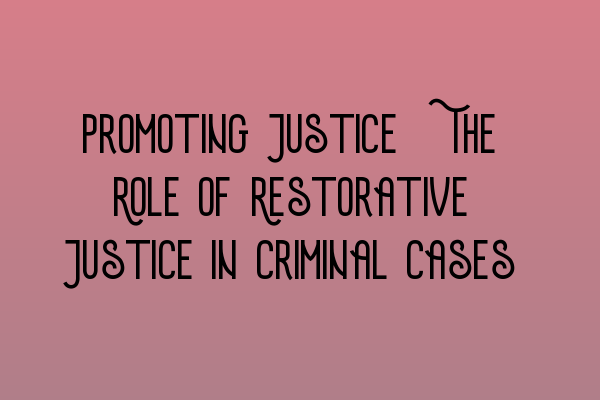Promoting Justice: The Role of Restorative Justice in Criminal Cases
Welcome to the SQE Criminal Law & Practice Law UK blog! In today’s post, we will explore the fascinating and important topic of restorative justice in criminal cases. Restorative justice offers an alternative approach to traditional criminal proceedings, aiming to promote healing, accountability, and justice for all parties involved.
What is Restorative Justice?
Restorative justice is a victim-centered approach that focuses on repairing the harm caused by crime. It involves bringing together the victim, the offender, and other affected parties to facilitate dialogue, understanding, and resolution. Unlike the adversarial nature of the traditional criminal justice system, restorative justice emphasizes communication, empathy, and community involvement.
Demystifying the Solicitors Qualifying Examination Format
The Key Principles of Restorative Justice
Restorative justice is guided by several core principles that guide its implementation in criminal cases:
- Inclusion: All stakeholders impacted by the crime, including the victim, offender, and community, should have the opportunity to participate in the restorative justice process.
- Voluntariness: Participation in restorative justice processes should be voluntary, and all parties must consent to engage in the dialogue and resolution efforts.
- Accountability: Offenders are encouraged to take responsibility for their actions and make amends to the victim or community.
- Healing and Support: The process should prioritize the emotional and psychological well-being of the victim and provide support throughout the journey.
- Community Engagement: Restorative justice recognizes that criminal behavior affects the community as a whole, and therefore, community members play an integral role in the process.
The Benefits of Restorative Justice
Restorative justice offers numerous benefits for all parties involved in criminal cases:
- Empowerment of the Victim: Restorative justice provides victims with a voice, allowing them to share their experiences, express their feelings, and participate in the decision-making process.
- Increased Offender Accountability: Rather than purely punitive measures, restorative justice holds offenders accountable through meaningful dialogue, understanding the impact of their actions, and undertaking actions to repair the harm caused.
- Reduced Recidivism: Studies have indicated that restorative justice programs have lower recidivism rates compared to traditional criminal justice approaches. By addressing the root causes of criminal behavior, restorative justice aims to break the cycle of crime.
- Community Healing and Reintegration: Restorative justice involves the participation of community members, fostering healing and promoting the reintegration of offenders into society.
How Restorative Justice Works
Restorative justice processes can take various forms, depending on the jurisdiction and specific circumstances of the case. However, there are common elements that characterize most restorative justice programs:
- Preparation: Trained facilitators prepare all parties involved for the restorative justice process, ensuring their understanding of the goals and principles.
- Dialogues: Facilitators guide structured dialogues between the victim and the offender, enabling them to share their experiences, feelings, and perspectives.
- Resolution: Participants collaborate to reach a mutually agreed-upon resolution, which may involve restitution, apologies, community service, or rehabilitative measures.
- Follow-Up: The progress and compliance with the agreed-upon resolution are monitored to ensure accountability and support.
LLC Formation Made Simple: Step-by-Step Guide for UK Entrepreneurs
Restorative Justice in Practice
Restorative justice programs have been successfully implemented in various jurisdictions around the world. Examples include:
- New Zealand: The country’s justice system has embraced restorative justice principles, involving victim-offender conferences and community-led processes as part of their criminal cases.
- Norway: Norway’s emphasis on restorative justice has led to lower incarceration rates and a focus on rehabilitation rather than punishment.
- United Kingdom: Restorative justice initiatives have been integrated into the criminal justice system, providing victims and offenders with the opportunity to participate in the resolution process.
LLC Formation: A Step-by-Step Guide for UK Entrepreneurs
In Conclusion
Restorative justice offers a valuable alternative to traditional criminal proceedings, promoting healing, accountability, and community involvement. By prioritizing dialogue, understanding, and resolution, restorative justice empowers victims, holds offenders accountable, and facilitates the reintegration of offenders into society.
To learn more about criminal law and related topics, check out our other articles:
- Business Regulations in the UK: A Comprehensive Overview
- Decoding Corporate Structures: A Comprehensive Legal Insight
Thank you for reading! Stay tuned for more informative content from SQE Criminal Law & Practice Law UK.
